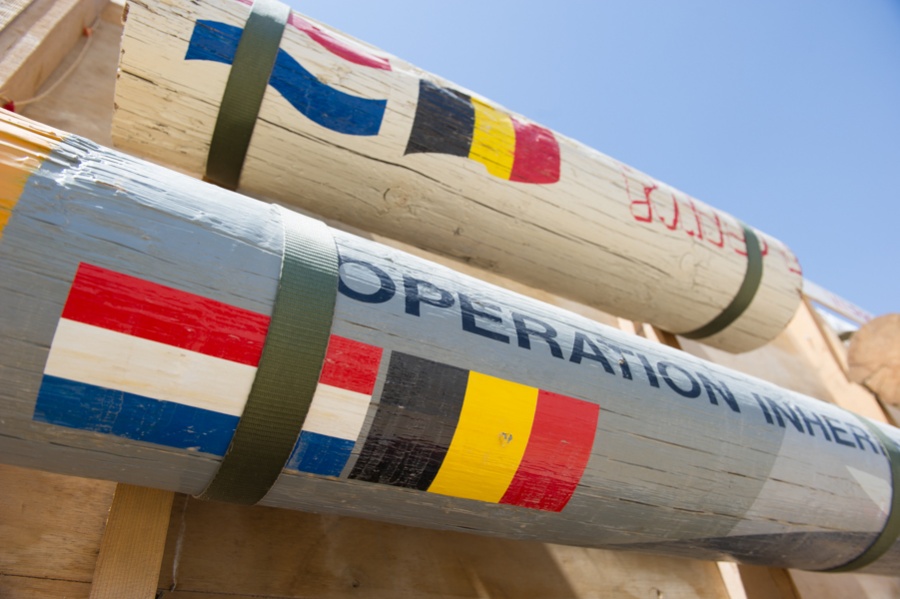The stark contrast between local accounts of civilian deaths in Iraq that I analyse each day, and the sterile portrayal of the air campaign against ISIL by Coalition militaries, is often striking. As the Airwars researcher focused on Belgium and the Netherlands, bridging the gap between these two positions has become a key part of my daily work.
On a regular working day I move back and forth between military discourse about a ‘clean track record’ and ‘zero civilian casualties’ (Belgium) and ‘we are transparent enough’ (the Netherlands) on the one hand – and counting the number of dead after airstrikes on a West Mosul neighbourhood.
Belgium and the Netherlands launched their first bombs in October 2014 – and have carried out respectively about 390 and 500 airstrikes each (although the most recent numbers are lacking). In almost 1,000 days of war, they have not admitted a single civilian casualty between them.
For the United States the gap between its killing a civilian and publicly admitting the fact is now around six weeks. The Netherlands says it is still investigating one incident from December 2014 – more than two years ago – and refuses to divulge any details of a second case.
Belgium, for its part, had firmly claimed “zero civilian casualties” – until it was revealed that the country was possibly involved in a catastrophic incident in New Mosul on March 17th 2017. The Minister says he now awaits the results of Coalition investigations – but the country’s own Public Prosecutor has already decided not to investigate.
Transparency “behind closed doors”
Last month Airwars presented its civilian casualty data to the Belgian Parliament’s Defence Committee and called for more openness. Yet that same day, the Committee’s Chair claimed in an opinion article that Airwars dealt in “semi-truths” and that our “conclusions were wrong”. She suggested that YouTube and Facebook were unreliable sources for civilian casualty investigations. Instead, she argued, “an entire team of professionals at the Combined Air Operations Centre (CAOC)” was best suited for this job. Moreover, she claimed “full transparency in Parliament” and deemed Belgian parliamentary control sufficient to check the actions of the military.
Yet the Belgian parliament is only informed about the country’s airstrikes in secret closed-door sessions, while the public is told nothing. And the Coalition only employs two civilian casualty assessors – with a backlog of more than 700 alleged incidents yet to be investigated.
In fact social media can be crucial in identifying civilian casualty events: for instance in a September 2015 Mosul case that the US has recently admitted. International media ignored the event completely at the time, which was only known at first by locals posting reports on Facebook.
Both the Netherlands and Belgium continue to lurk at the bottom of transparency tables for Coalition participants, generally still refusing to say where, when or what they bomb. Yet on the ground, affected civilians continue to be at great risk from airstrikes, and they suffer too from a lack of accountability and recognition. A closed-door parliamentary meeting does not equate to public accountability, in our view.
An Iraqi-Dutch perspective
On the occasion of 1,000 days of war, Airwars also spoke with Mahmood and Husain Al Sabari, both students and members of the Union of Iraqi Youth in the Netherlands, about their view on the war and the involvement of the Netherlands. The two Dutch-Iraqi brothers – one now living in London – said that what troubled them most were not the Dutch airstrikes or lack of transparency, but the absence of awareness about the role of Western countries in contributing to instability in the Middle East.
Mahmood thinks that launching bombs is not the way to get rid of dictators or extremist groups. “Yet the Dutch military contribution is marginal, compared to the role of the US and other countries. What is most painful for us, is the lack of knowledge among fellow Dutch youth about the Western involvement in the region. This is regarding the bombs, but more importantly in terms of the ongoing arms trade and the decision to choose sides by training certain groups. And then it seems that people do not see the link with migration, which is framed as a problem, a crisis. That is really frustrating sometimes.”
Husain agrees. “That is why we don’t really talk about this topic with peers anymore. The lack of knowledge makes it feel like we’re on a different wave-length; we really speak a different language when it comes to this.”
When asked what they think of the poor transparency records in the Netherlands, the brothers say they are not really shocked. Mahmood admits that “since six or seven years, I have come to view Western democratic principles as rather hypocritical.” Husain, for his part, said he did not really know why the Dutch are so silent about the air campaign. He suggests that it might be an attempt to keep a reputation of “a dove of peace”. He continues: “But you know, people don’t really care. They don’t care about accountability. Maybe just a few people, like you, do.”
This 1,000 days of war highlights once again the continuing importance of accountability and the need to bridge realities. Airwars’ call for more transparency and visibility is gaining support in both the Netherlands and Belgium, and is a view shared by supportive media, NGOs and political parties.

